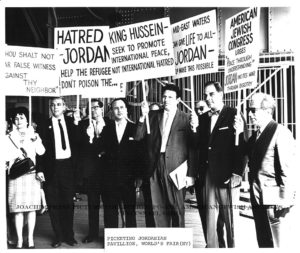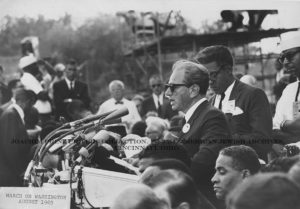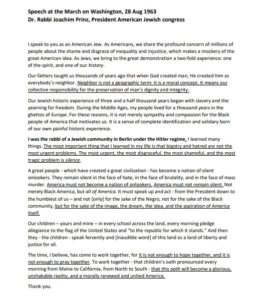The Problem of Silence: Rabbi Joachim Prinz Speech at the March on Washington
Rabbi Joachim Prinz (1902-1988) was a Berlin-based rabbi until fleeing Nazi Germany in 1937. Prinz was ordained at the Jewish Theological Seminary in Breslau and served as a rabbi in Berlin until the Nazi government formally expelled him from Germany. In the U.S., Prinz became a vocal advocate for the civil rights movement as well as for the Zionist cause.
In addition to his congregational work—most importantly as spiritual leader of Temple B’nai Abraham in Newark, New Jersey—Prinz was active in national and world affairs, joining the executive board of the World Jewish Congress in 1946. He also served as president of the American Jewish Congress from 1958-1966. He devoted much of his life in the United States to the Civil Rights Movement, joining picket lines across America protesting racial prejudice from unequal employment to segregated schools, housing, and all other areas of life. His papers are preserved at the Jacob Rader Marcus Center of the American Jewish Archives at HUC-JIR/Cincinnati.
On 28 August 1963, Prinz spoke at the famous March on Washington, presenting a speech that related Jewish suffering to the U.S. civil rights movement. He accentuated:
As Jews we bring to this great demonstration, in which thousands of us proudly participate, a two-fold experience — one of the spirit and one of our history.
In the realm of the spirit, our fathers taught us thousands of years ago that when God created man, he created him as everybody’s neighbor. Neighbor is not a geographic term. It is a moral concept. It means our collective responsibility for the preservation of man’s dignity and integrity.
From our Jewish historic experience of three and a half thousand years we say:
Our ancient history began with slavery and the yearning for freedom. During the Middle Ages my people lived for a thousand years in the ghettos of Europe . Our modern history begins with a proclamation of emancipation.
It is for these reasons that it is not merely sympathy and compassion for the black people of America that motivates us. It is above all and beyond all such sympathies and emotions a sense of complete identification and solidarity born of our own painful historic experience.
Furthermore, in reflection of his time in Nazi Germany, Prinz informed: “the most important thing that I learned under those tragic circumstances was that bigotry and hatred are not the most urgent problem. The most urgent, the most disgraceful, the most shameful and the most tragic problem is silence.”

A photograph of Rabbi Dr. Joachim Prinz picketing at the Jordanian Pavilion at the World’s Fair in New York, with six other individuals, New York, NY, approx. May 1964. PC-3551. American Jewish Archives, Cincinnati, Ohio.

A black and white photograph of Rabbi Dr. Joachim Prinz giving a speech at the March on Washington, August 1963, directly prior to the speech offered by Rev. Martin Luther King, Jr. PC-3551. American Jewish Archives, Cincinnati, Ohio.
![A black and white photograph of Rabbi Dr. Joachim Prinz on a panel with David Ben Gurion – the first Prime Minister of the State of Israel. Ben Gurion is sitting to the left, his face rested in his hand. Joachim Prinz is standing to Ben Gurion’s right, in front of three microphones, and appears mid-speaking. Behind them and the panel, on the back of the stage, are five flags alternating between the U.S. and Israeli flags, along with the words “[…] Conference on Israel” and “Jerusalem, June 1962” in English and the same phrases listed above them in Hebrew letters. In the center of the stage is a wall panel with the Star of David.](https://www.americanjewisharchives.org/wp-content/uploads/pc3551.10-300x225.jpg)
A black and white photograph of Rabbi Dr. Joachim Prinz on a panel with David Ben Gurion, first Prime Minister of the State of Israel, Jerusalem, 1962. PC-3551. American Jewish Archives, Cincinnati, Ohio.
![A black and white photograph of Rabbi Dr. Joachim Prinz [third from the left] with a group of men, including Martin Luther King, Jr [second from the left] and President Kennedy [third from the right]. The men are dressed in suits and dress clothes, with their arms around each other posing for the photograph. Each individual wears a matching round button, though the words or images on the button cannot be clearly made out. The individuals in this image led in the planning of the March on Washington. Washington, D.C., 1963.](https://www.americanjewisharchives.org/wp-content/uploads/pc3551.26-300x246.jpg)
A black and white photograph of Rabbi Dr. Joachim Prinz [third from the left] standing with a group of men, organizers for the March on Washington, including Martin Luther King, Jr [second from the left] and President Kennedy [third from the right]. The individuals in this image led in the planning of the March on Washington. Washington, D.C., 1963. PC-3551. American Jewish Archives, Cincinnati, Ohio.

Text of speech offered by Joachim Prinz at the March on Washington. American Jewish Archives, Cincinnati, Ohio.

